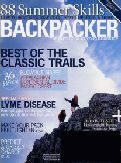

| Home | ||||
| Articles | ||||
| Books | ||||
| Resume | ||||
| Contact | ||||
| Blog | ||||
|
||||
|
Lay of the Land July/August 2007 Biting the Wrong Bullet California condors, whose numbers fell to as few as 22 birds in the 1980s, are soaring back from the brink of extinction, largely due to an aggressive, decades-long captive breeding program. Some 130 condors, North America's largest land bird, now fly free over Arizona, California, and Mexico. But they still face the same threats that nearly wiped them out before--most notably, lead poisoning from hunting ammunition. These scavengers feed on animal carcasses and often ingest lead bullet fragments in gut piles left be-hind by hunters. Last August, researchers from the University of California at Santa Cruz used isotopic fingerprinting techniques to match the lead in bullets to the lead in condor blood samples, conclusively proving the connection. At least 13 condors have died from lead contamination since the breeding and reintroduction program began in 1992, and dozens more have required chelation treatments to survive. This summer, the California Fish and Game Commission is voting
on whether to ban lead bullets and shot in condor territory. Meanwhile,
in Arizona, conservationists are giving away copper bullets as
a less toxic alternative. For more information, visit biologicaldiversity.org/swcbd/species/condor/index.html.
--Amy Ettinger |

